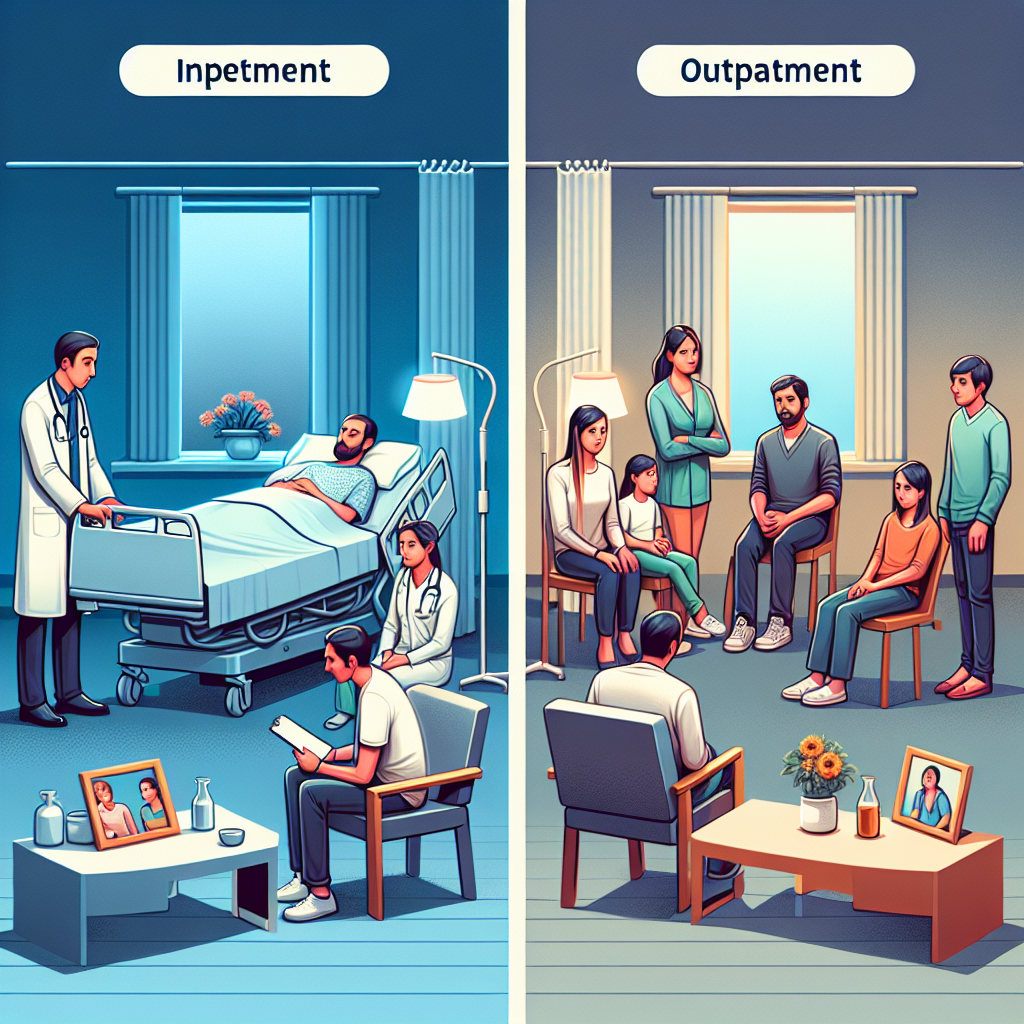-
Table of Contents

“Inpatient treatments offer structured, immersive family therapy sessions, while outpatient treatments provide flexible, ongoing family support integrated into daily life.”
Introduction
Inpatient and outpatient treatments for addiction recovery differ significantly in their approach to family involvement, reflecting the distinct nature and intensity of each treatment modality. Inpatient treatment, also known as residential treatment, typically involves a more immersive and structured environment where patients reside at the treatment facility for an extended period. This setting allows for intensive therapy and continuous monitoring, often incorporating family therapy sessions and educational programs designed to engage family members in the recovery process. The goal is to create a supportive network that can aid in the patient’s long-term sobriety. Conversely, outpatient treatment offers more flexibility, allowing patients to live at home and maintain their daily responsibilities while attending scheduled therapy sessions. Family involvement in outpatient settings may be less intensive but still crucial, often facilitated through regular family counseling sessions and support groups. This approach aims to integrate recovery into the patient’s everyday life, encouraging family members to participate actively in the healing process while balancing other commitments. Both treatment modalities recognize the pivotal role of family support in addiction recovery, yet they tailor their strategies to fit the specific needs and circumstances of the patient.
The Role of Family in Inpatient Addiction Recovery: Strategies and Benefits
In the realm of addiction recovery, the role of family involvement cannot be overstated. Inpatient treatment programs, in particular, place a significant emphasis on integrating family into the recovery process. This approach is rooted in the understanding that addiction is not an isolated struggle but one that affects the entire family unit. By involving family members, inpatient programs aim to create a supportive environment that fosters healing and long-term recovery.
One of the primary strategies employed in inpatient addiction recovery is family therapy. This therapeutic approach brings together the individual in recovery and their family members to address the dynamics that may have contributed to the addiction. Through guided sessions with a trained therapist, families can explore patterns of behavior, communication issues, and unresolved conflicts. This process not only helps the individual in recovery gain insight into their addiction but also allows family members to understand their role in the recovery journey. By fostering open communication and mutual understanding, family therapy can strengthen the family unit and provide a solid foundation for sustained recovery.
In addition to family therapy, inpatient programs often offer educational workshops for family members. These workshops are designed to provide families with the knowledge and tools they need to support their loved one’s recovery. Topics may include understanding the nature of addiction, recognizing triggers and warning signs of relapse, and learning effective communication strategies. By equipping families with this information, inpatient programs empower them to become active participants in the recovery process. This sense of involvement can be incredibly motivating for both the individual in recovery and their family members, as it reinforces the idea that they are not alone in their journey.
Moreover, inpatient treatment centers frequently organize family visitation days. These designated times allow family members to visit their loved one in a structured and supportive environment. During these visits, families can participate in group activities, attend therapy sessions, and engage in open discussions about the recovery process. This hands-on involvement helps to rebuild trust and strengthen familial bonds that may have been strained by the addiction. It also provides an opportunity for family members to witness the progress their loved one is making, which can be a powerful source of encouragement and hope.
The benefits of family involvement in inpatient addiction recovery are manifold. For the individual in recovery, having the support of their family can significantly enhance their motivation and commitment to the treatment process. Knowing that their loved ones are actively involved and invested in their recovery can provide a sense of accountability and encouragement. For family members, being part of the recovery process can help them heal from the emotional and psychological impact of their loved one’s addiction. It allows them to develop a deeper understanding of the challenges their loved one faces and fosters empathy and compassion.
Furthermore, involving family in the recovery process can lead to better long-term outcomes. Research has shown that individuals who have strong family support are more likely to maintain their sobriety and experience fewer relapses. This is because family involvement creates a network of support that extends beyond the treatment center, providing ongoing encouragement and accountability.
In conclusion, the role of family in inpatient addiction recovery is integral to the success of the treatment process. Through strategies such as family therapy, educational workshops, and family visitation days, inpatient programs actively involve families in the recovery journey. The benefits of this involvement are profound, offering emotional support, fostering understanding, and enhancing long-term recovery outcomes. By embracing the power of family, inpatient treatment centers create a nurturing environment where individuals can heal and rebuild their lives with the unwavering support of their loved ones.
Family Involvement in Outpatient Addiction Treatment: Approaches and Outcomes
Family involvement plays a crucial role in the recovery process for individuals battling addiction, and the approach to integrating family can vary significantly between inpatient and outpatient treatments. In outpatient addiction treatment, the emphasis on family involvement is often more pronounced and multifaceted, given the nature of the treatment setting and the flexibility it offers. This approach not only aids in the recovery of the individual but also fosters a supportive environment that can lead to more sustainable outcomes.
Outpatient treatment programs typically allow individuals to live at home while attending scheduled therapy sessions and support groups. This structure inherently encourages family participation, as it provides numerous opportunities for family members to engage in the recovery process. One of the primary methods of involving family in outpatient treatment is through family therapy sessions. These sessions are designed to address the dynamics within the family that may contribute to the addiction, as well as to educate family members about the nature of addiction and recovery. By participating in these sessions, family members can learn effective communication skills, set healthy boundaries, and develop a deeper understanding of the challenges their loved one faces.
Moreover, outpatient programs often include educational workshops and support groups specifically for family members. These resources aim to equip families with the knowledge and tools they need to support their loved one’s recovery journey. For instance, family members might learn about the triggers and warning signs of relapse, as well as strategies for providing emotional support without enabling addictive behaviors. This education can be empowering, as it helps families feel more confident and capable in their role as supporters.
Another significant aspect of family involvement in outpatient treatment is the emphasis on creating a stable and nurturing home environment. Since individuals in outpatient programs continue to live at home, the family’s role in maintaining a supportive atmosphere is critical. Outpatient treatment providers often work closely with families to develop a home environment that promotes sobriety and reduces stressors that could lead to relapse. This might involve creating routines, establishing clear expectations, and fostering open lines of communication.
The outcomes of family involvement in outpatient addiction treatment can be profoundly positive. Research has shown that individuals who have strong family support are more likely to complete treatment programs and maintain long-term sobriety. The collaborative effort between the individual and their family can lead to improved mental health, stronger relationships, and a more cohesive family unit. Additionally, family members who are actively involved in the recovery process often experience their own personal growth and healing, as they learn to navigate the complexities of addiction and recovery.
In conclusion, the approach to family involvement in outpatient addiction treatment is comprehensive and integral to the success of the recovery process. By incorporating family therapy, educational resources, and strategies for creating a supportive home environment, outpatient programs empower families to play an active role in their loved one’s journey to sobriety. The positive outcomes associated with this involvement underscore the importance of a collaborative and informed approach to addiction recovery, ultimately leading to healthier individuals and stronger family bonds.
Q&A
1. Inpatient treatment programs often involve structured family therapy sessions and educational workshops to help family members understand addiction and learn how to support their loved one’s recovery.
2. Outpatient treatment programs may offer family counseling and support groups, but the involvement is typically less intensive and more flexible, allowing family members to participate according to their schedules.
Conclusion
Inpatient treatment programs typically involve more structured and intensive family involvement, often including scheduled family therapy sessions, educational workshops, and support groups designed to help family members understand addiction and develop coping strategies. Outpatient treatment programs, while also encouraging family participation, generally offer more flexible and less frequent opportunities for family involvement, such as periodic family counseling sessions and support group meetings, allowing family members to balance their participation with other daily responsibilities.



